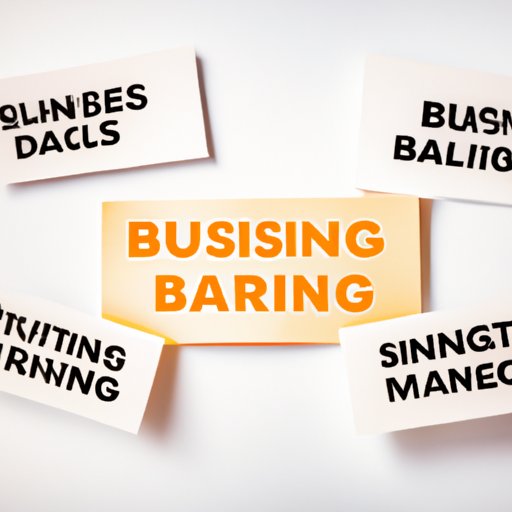
I. Introduction
Starting a business is an exciting and rewarding career move. However, one major roadblock stands between entrepreneurs and their dreams: money. Estimating the amount of money required to start a business can be overwhelming and discouraging. In this comprehensive guide, we will provide advice on estimating the amount of money you need to start a business, as well as tips on how to minimize your costs so that you can start your business without breaking the bank.
II. Analyze Different Business Models
Before estimating how much money is required to start a business, it is essential to analyze different business models. Different business models have different financial requirements and potential revenue streams. For example, a service-based business has a lower initial investment than a product-based business. Whereas a franchise-based business has both the advantages and disadvantages of a pre-existing system. Understanding the advantages and disadvantages of each type of business model can save you time and money in the long run.
Minimum and maximum investment ranges vary from business to business. A service-based business can have a minimum investment of less than $1000, while a franchise-based business can have an investment of more than $100,000. Choose a business model that suits your budget.
III. Conduct Market Research
Conducting market research is necessary to estimate how much money is required to start a business. Market research helps to determine your product’s demand, target market, competition, and price range. All these factors affect the business’s financial requirements.
To conduct market research, you can ask survey questions, conduct interviews, and gather data. These methods help give an idea of how much demand your product will have and how much revenue the product can generate.
Based on market research findings, you can estimate the amount of money your business requires to run.
IV. Plan Your Budget
Planning a budget is essential before starting a business. A budget provides an estimate of expenses and revenue in a given timeline. Breaking down expenses also reveals where to focus on minimizing costs.
Essential and non-essential items in a budget are crucial to distinguish. Essential expenses are required for the business’s survival, while non-essential expenses contribute to business growth. Business growth should be planned, keeping in mind the cost of survival and avoiding over-investment in non-essential expenses.
When creating a budget, be realistic. Unexpected expenses are likely to arise that may increase or decrease your budget.
V. Find Funding Sources
Starting a business requires funding, and there are various types of funding options available, such as personal savings, loans, grants, and crowdfunding. Personal savings come with minimal formal costs, and taking loans means long-term debt, while grants and crowdfunding may require more time and hard work.
To find a suitable funding option for a given business, it’s essential to research the different types of funding, their eligibility requirements, application procedures, and their advantages and disadvantages.
VI. Leverage Your Skills
Starting a business with no money is possible. Identifying skills and talents that can be turned into businesses is a key factor. Many such businesses have a low initial cost, such as freelance writing, pet-sitting, and tutoring.
Free online tools and resources can also be used to leverage existing skills. Online marketing is an example of utilizing resources without spending a lot. Social media platforms can be used to advertise the business inexpensively. Email is another option to increase sales without spending money.
VII. Minimize Costs
To start a business with minimal costs, it is necessary to prioritize expenses and minimize them. For example, renting a fancy office space is likely not affordable within a startup budget. Consider alternatives, such as working from home or shared office spaces.
Other options to minimize costs include minimizing the number of employees starting and focusing on acquiring customers instead. Many companies started small and grew larger by focusing on customer’s needs and adding employees later when necessary.
VIII. Seek Professional Input
It is crucial to seek professional advice when starting a business, especially when it comes to finances. Accountants and attorneys specialized in small business start-ups can provide much-needed advice on budgeting, funding options, tax breaks, marketing opportunities, and other vital areas.
Professional input is especially beneficial when dealing with legal procedures, such as registering the business and obtaining necessary licenses and permits. Experts avoid costly mistakes that can arise from a lack of knowledge about financial and legal knowledge and save both time and money.
IX. Conclusion
When starting a business, it is essential to be realistic and practical. Different business models, market research, budget planning, funding sources, minimizing costs, and seeking professional advice can help in estimating the amount of money required to start a business. It’s essential to be patient and persevere. A positive attitude combined with the right focus and expertise can lay the foundation of a successful business.




